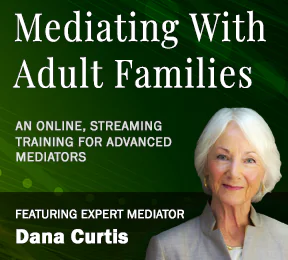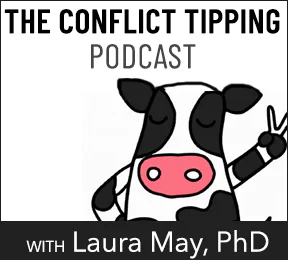I often present to mediators for an hour or so on the transformative approach. There are certain questions that come up regularly. Here’s a typical conversation I might have with these mediators toward the end of my presentation.
Question: What if it’s clear that the parties have no ability or desire to see each other’s perspective? We’ve all seen parties like that.
Dan: I actually don’t know that I’ve seen parties like that. While it’s true that I’ve seen parties who, as far as I could tell, over the course of up to a few hours, hadn’t shown any significant increase in understanding each other, that has never been enough to convince me either that they couldn’t or didn’t want to. In fact, I like to be the one person who will never come to the conclusion that a certain party is beyond hope. It’s common for others to make that decision and thereby foreclose opportunities for the shifts to happen; often one party believes the other can’t or won’t shift; the legal paradigm often disregards the potential for mutual understanding. Many mediators assume that the only possible progress comes from a purely self-interested negotiation. My clients, on the other hand, have the benefit of a mediator who will never interfere with the opportunity for them to understand each other.
Question: Isn’t it sort of unethical to keep people in a process that might never help them?
Answer: Yes, it would be. That’s one of the reasons that self-determination remains the central focus of transformative mediation throughout the process. Parties are completely supported in deciding at any point that the process is not for them – the mediator does not suggest that they should try a little longer or that the alternative is worse – nor does the mediator ask questions designed to suggest those things. The transformative mediator acts consistently with complete support for the parties’ choices. If a party says they’re done, the mediator’s answer is “Ok.”
Question: Don’t you lose a lot of clients that way?
Answer: As a matter of fact, 100% of my mediations have ended when the parties chose (unless I ended it earlier because of scheduling issues).
Question: Right, but haven’t you had sessions end early?
Answer: First of all, it’s not my place to decide what early is. Second of all, there have only been a handful of times when a party has ended a session when the other party clearly wished to continue. And in about half of those cases, both parties chose to return for another meeting. So my sense is that my supportive attitude toward ending when a party wants to has not decreased and has probably increased parties’ likelihood of sticking with the process. A process that is truly, completely voluntary throughout is more appealing than one in which there is pressure to continue.
Question: I understand that transformative mediation is intended to be non-directive, but what do you do when the conversation gets off track?
Answer: And what do you mean by off track?
Question: Well let’s say it gets heated, or they keep talking about things that aren’t constructive, or they keep repeating themselves?
Answer: My intention is to support the conversation. I’m there for them to turn to, the moment they aren’t happy with how it’s going. If they tell me they don’t like how it’s going, I’m there to help them process what they’d like to do differently. If they don’t tell me that, I remain present to support what they’re doing, by reflecting and summarizing what I’m hearing. I also check in with them occasionally to remind them that they get to decide how to proceed. But it is not my place to decide that the conversation is off track.
Question: Have you ever had clients complain that you weren’t doing anything?
Answer: Great question! I very much had the fear of that when I started transitioning from a problem-solving approach to a transformative one. In a training where Baruch Bush was the instructor, I remember Baruch saying, “Now if your clients make these empowerment shifts and recognition shifts, won’t that be good for them?” And I said, “Yes, but I’m afraid they won’t give me credit for it.” And I HAVE had clients make jokes, particularly after a conversation has gone well on all levels, where they look at me and say something like, “what did YOU do?” They do often experience that they themselves and the other party handled things surprisingly well – their focus is less on me and more on themselves and each other. But I’ve decided that it’s more important to BE helpful than to APPEAR helpful. We’ve probably all seen professionals who seemed to be focused on trying to appear like they were adding value. My clients have no fear of that with me.
Question: Does this really work?
Answer: In my experience, yes. Also, see the research on the US Postal Service REDRESS program (satisfaction rates over 90% for both sides, and closure rates close to 80% after one session). And see the recent studies by the ABA and by the State of Maryland – both show positive results associated with supportive techniques, and negative results associated with more controlling techniques.








